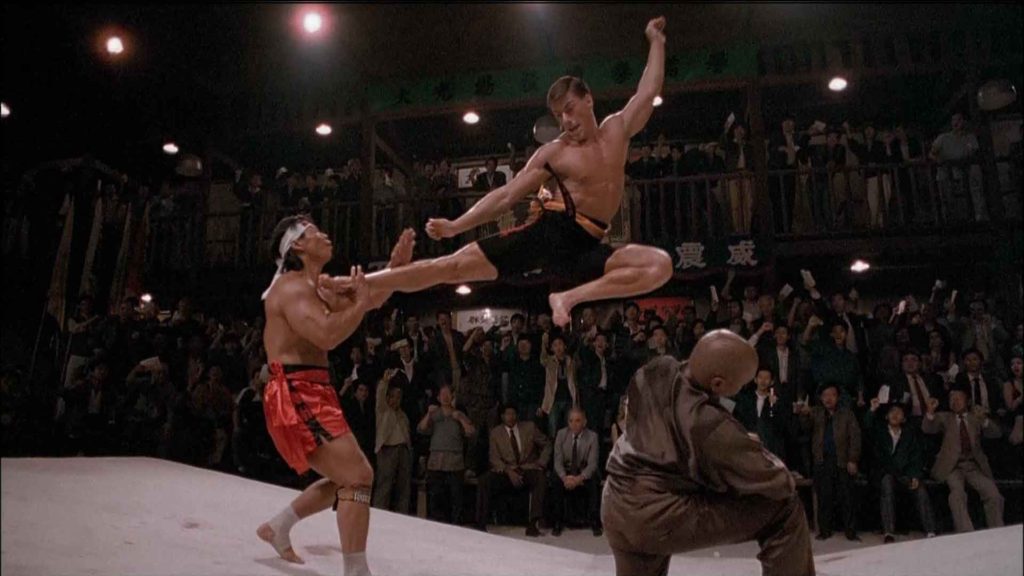“Bloodsport,” the 1988 film directed by Newt Arnold and starring Jean-Claude Van Damme (in his American debut role, no less) is solid, but not spectacular, but good fun nonetheless. “Bloodsport” tells a piece of the story of a Japanese-trained American soldier named Frank Dux; and while a quick Google search of his name would give away the ending of this movie, in the spirit of Man Movie May, no spoilers will be given. “Bloodsport” features action aplenty and a dearth of depth or plot. If that’s enough for you, keep reading. If not, fighters like “Cinderella Man” or “Rocky” may be more your speed.
“Bloodsport” gets its name from the nature of this contest – called the Kumite – a secret full contact martial arts contest being held in Hong Kong at the time this movie takes place. Fighters from all over the world vie for the chance to win the title. With Dux (Van Damme) becoming the first Westerner with a real chance at winning the contest, Chong Li (Bolo Yeung) takes a keen dislike of the man and vows to take him down. “You’re next,” he taunts as he brutally defeats one of Dux’s American friends.
The hallmark of “Bloodsport” is obviously its fighting, and the choreography is pristine and exciting. Many of the film’s bouts take mere seconds, and director of photography David Worth makes the bouts seem exciting while boasting a brand of fighting many of us aren’t used to seeing in fighting movies. The picture draws clear inspiration from 1984’s “The Karate Kid,” from the underdog poised to win motif to the less than honorable defending champ; however, “Bloodsport,” an apt name, makes no bones about just how brutal and vicious it can be. Chong Li has killed men in the ring before. When he kills one during “Bloodsport’s” run-time, and the judges turn their back on him in shame, he scoffs and pouts. But honestly he should be in jail. This is no “Mortal Kombat,” and a sense of honor runs through the Kumite and its participants that Dux clearly demonstrates.
For its high points, the movie is basically an engaging beginning and exciting end sandwiched between a humdrum middle act, full of the kind of things that push the envelope of disbelief a little too far. Dux is military, and goes AWAL from his unit to compete in the Kumite, and is hotly trailed by two military personnel, played flatly by Norman Burton and a wasted Forest Whitaker. They’re both extremely one note, with a goal to stop Dux from competing in the name of “not letting him get hurt;” which is of course just code for not letting the government’s investment in this super-soldier go to waste. Their scenes are some of the more lax parts of the movie, and honestly could have been written out of the film completely with no loss to the production whatsoever.

There’s also a thinly developed role for an actress named Leah Ayres, who plays a journalist and love interest for Frank that begins to get developed, and then is dropped mostly altogether. Her character is also rather confusing. She starts off needing Dux’s defense to not get raped in an opening scene, then positions herself as willing to do anything to get into the Kumite to cover it, and then gets emotionally attached to Dux and ‘Jackson,’ another American fighter, to the point where she can’t do her job. A few more churns of the script thought he gristmill would have doubtless came up with a more powerful role for her, but she, like Burton and Whitaker, take second chair to a film obviously devoted to Van Damme and Yeung.
Fight-wise, “Bloodsport” does a good job upping the ante on the combat sequences, which become more brutal and long-lasting as time goes on. Additionally, it excels in its first act, which shows American Dux being trained in martial arts by a man named Senzo Tanaka (Roy Chiao) after the man loses his own son and has no one which to pass down his knowledge. Winning the Kumite to Dux is not about victory, but honor. Van Damme, with his limited acting skills, manages to instill that honor with ease.
It must be said, however, that the acting in “Bloodsport” is markedly poor, with most if not all of the cast reduced to stereotypes. Dux, the hero, Jackson, the rebel, Janice the reporter, and Chong the villain. None of the them get anything that really answers for depth, and the result is a picture that lands by-the-numbers- when it had so much more to offer.
At the end of the day, “Bloodsport” is a solid effort. It boasts its martial arts prowess, does have you on the edge of your seat during some of the fight sequences, and is ‘80s through and through. It comes up a little short in the drama and acting department, but its forgivable. If you can tolerate a thin script and characters but are looking for a solid man movie, you could do a lot worse than “Bloodsport.”